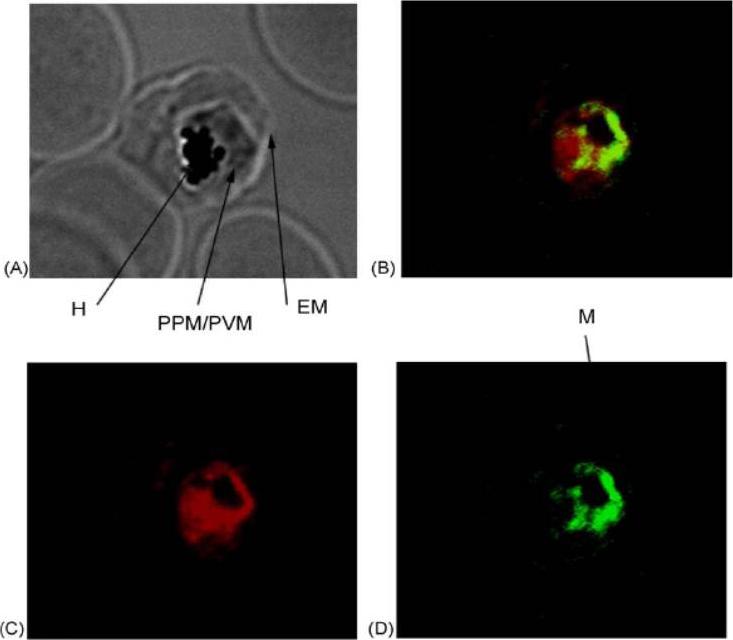PCHAS_1359800 aconitate hydratase, putative
Disruptability [+]
| Species | Disruptability | Reference | Submitter | |
|---|---|---|---|---|
| P. berghei ANKA |
Possible |
RMgm-4081 | Imported from RMgmDB | |
| P. berghei ANKA |
Refractory |
PlasmoGEM (Barseq) | PlasmoGEM | |
| P. falciparum 3D7 |
Possible |
25843709 | Theo Sanderson, Wellcome Trust Sanger Institute | |
| P. falciparum 3D7 |
Possible |
25843709 No exflagellation |
Theo Sanderson, Wellcome Trust Sanger Institute | |
| P. falciparum 3D7 |
Possible |
USF piggyBac screen (Insert. mut.) | USF PiggyBac Screen | |
Mutant phenotypes [+]
| Species | Stage | Phenotype | Reference | Submitter |
|---|---|---|---|---|
| P. berghei ANKA | Asexual |
No difference |
RMgm-4081 | Imported from RMgmDB |
| P. falciparum 3D7 | Asexual |
No difference |
25843709 | Theo Sanderson, Wellcome Trust Sanger Institute |
| P. falciparum 3D7 | Asexual |
No difference |
25843709 No exflagellation |
Theo Sanderson, Wellcome Trust Sanger Institute |
| P. berghei ANKA | Gametocyte |
No difference |
RMgm-4081 | Imported from RMgmDB |
| P. falciparum 3D7 | Gametocyte |
Attenuated |
25843709 No exflagellation |
Theo Sanderson, Wellcome Trust Sanger Institute |
| P. berghei ANKA | Ookinete |
Difference from wild-type |
RMgm-4081
Normal gametocyte production, normal exflagellation; strongly reduced ookinete production |
Imported from RMgmDB |
| P. berghei ANKA | Oocyst |
Difference from wild-type |
RMgm-4081
No oocyst production |
Imported from RMgmDB |
| P. berghei ANKA | Sporozoite |
Difference from wild-type |
RMgm-4081
No sporozoite production |
Imported from RMgmDB |
Imaging data (from Malaria Metabolic Pathways)

Visualization of PfIRPa via indirect immunofluorescence probing. The suspension of infected erythrocytes was first loaded with 50 nmoles MitoTracker for 30 minutes. The suspension was washed and fixed with 4% paraformaldehyde, 0.05% glutaraldehyde. The cells were allowed to adhere and to dry to poly-L-lysine–coated microscopic slides. The slides were washed in PBS-Tween (0.01%) and PBS. Nonspecific epitopes of cells were quenched with 5% BSA in PBS, washed, and probed with a primary antibody (rabbit polyclonal 3950) followed by a secondary antibody (goat antirabbit, alexa488). The slides were washed and mounted in the presence of VectaShield liquid, before taking fluorescence images. The images were taken at the excitation wavelengths of 488 nm for alexa488 and at the 680 nm for MitoTracker. Our immunofluorescence data further support the conclusion that PfIRPa is a cytosolic malarial protein, and it is not present in the mitochondrion of the parasite, at least at the trophozoite stage.Loyevsky M, LaVaute T, Allerson CR, Stearman R, Kassim OO, Cooperman S, Gordeuk VR, Rouault TA. An IRP-like protein from Plasmodium falciparum binds to a mammalian iron-responsive element. Blood. 2001 98:2555-62.
See original on MMP
Trophozoite-infected red blood cells were probed with primary antibodies [(rabbit anti-PfIRPa 3950) and (mouse anti-Hsp60)] followed by fluorescent secondary antibodies [(goat anti-rabbit, alexa568) and (goat anti-mouse alexa488)]. The mitochondrial compartment of the intraerythrocytic trophozoite was stained in green (D), whereas PfIRPa was stained in red (C). Light microscopic image of the same trophozoite-infected red blood cell is shown in A. Colocalization of red and green fluorescence (yellow B) is indicative of a mitochondrial localization of PfIRPa, but the protein is also visualized in the parasite cytosol/food vacuole. EM—erythrocyte plasma membrane, PPM—parasite plasma membrane, PVM—parasitophorous vacuole membrane, H—hemozoin, M—mitochondrion.Hodges M, Yikilmaz E, Patterson G, Kasvosve I, Rouault TA, Gordeuk VR, Loyevsky M. An iron regulatory-like protein expressed in Plasmodium falciparum displays aconitase activity. Mol Biochem Parasitol. 2005 143:29-38. Copyright Elsevier 2009.
See original on MMPMore information
| PlasmoDB | PCHAS_1359800 |
| GeneDB | PCHAS_1359800 |
| Malaria Metabolic Pathways | Localisation images Pathways mapped to |
| Previous ID(s) | PC000394.02.0, PCAS_135980, PCHAS_135980 |
| Orthologs | PBANKA_1355200 , PF3D7_1342100 , PKNH_1259300 , PVP01_1212700 , PVX_083005 , PY17X_1360900 |
| Google Scholar | Search for all mentions of this gene |